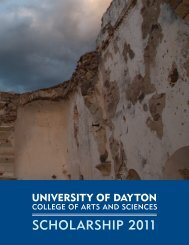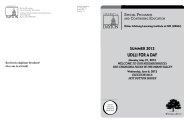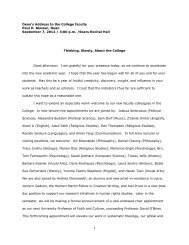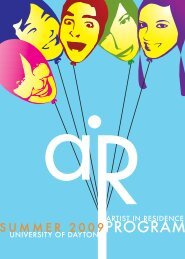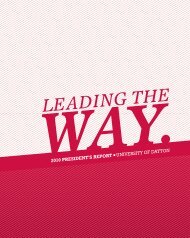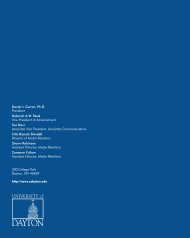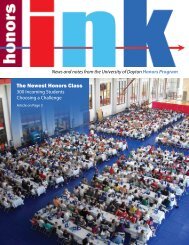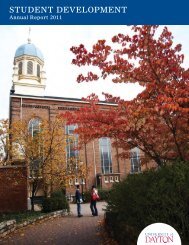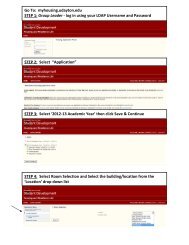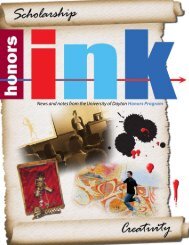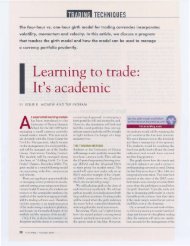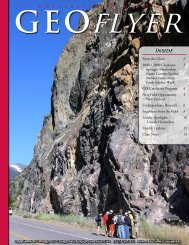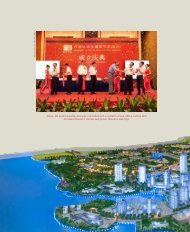Stander Symposium abstract book - University of Dayton
Stander Symposium abstract book - University of Dayton
Stander Symposium abstract book - University of Dayton
Create successful ePaper yourself
Turn your PDF publications into a flip-book with our unique Google optimized e-Paper software.
ORAL PRESENTATIONS<br />
for socially responsible practices. Students participating in the teach-in will explore the enforcement <strong>of</strong> federal and business policies from legal,<br />
economic and ethical perspectives.<br />
Life In the South African Townships<br />
Presenter(s): Olivia M Kellman<br />
Advisor(s): Anthony N Talbott<br />
Political Science<br />
3:20 PM-3:40 PM<br />
Independent Research Kennedy Union - 311<br />
During winter break 2011 - 2012, my family and I visited the country <strong>of</strong> South Africa. One day we visited the townships in the city Cape Town.<br />
During that visit, I shot a video <strong>of</strong> what we saw and how the people lived. In this video you will learn about their struggles <strong>of</strong> poverty and lack <strong>of</strong><br />
education. South Africa has recently joined the modern world <strong>of</strong> technology but the townships are still an issue even after the fall <strong>of</strong> Apartheid<br />
in 1994, where the national party government enforced a system <strong>of</strong> racial segregation. However, the effects <strong>of</strong> the Apartheid are still apparent.<br />
Through my presentation, you will learn that not only is race still an issue, but also the government is not even sure <strong>of</strong> the number <strong>of</strong> people that<br />
actually live in the townships. A majority <strong>of</strong> the children who grow up in the townships do not have basic essentials such as a bed to sleep in or a<br />
bath or shower as we know it. In one case, three different families share one room with three beds and the children have to find a place to sleep<br />
on the floor while the parents <strong>of</strong> each family take a bed. The people there want the rest <strong>of</strong> the world to know the conditions that they live in. Here<br />
in America, not many people know the reality <strong>of</strong> everyday life <strong>of</strong> the townships in South Africa. What we can do to help is make others aware <strong>of</strong><br />
this reality and spread the word.<br />
PSYCHOLOGY<br />
The Psycho-Ecological Systems Model for Engaged Scholarship and Service Learning:<br />
Theory, Research, and Practice<br />
Presenter(s): Alisa B Bartel, Sarah L Bidwell, Haylee Deluca, Kirsten M Kasper, Sara E Mason, Nyssa L Snow,<br />
Laura E Stayton, Anne L Steel<br />
Advisor(s): Roger N Reeb<br />
Psychology<br />
Independent Research<br />
2:00 PM-3:00 PM<br />
LTC - Team Space<br />
The Psycho-Ecological Systems Model (PESM; Reeb and Folger 2012), which was developed to inform and guide engaged scholarship and service<br />
learning research, integrates three conceptual developments: the principle <strong>of</strong> reciprocal determinism (Bandura 1978); the biopsychosocial model<br />
(Kiesler, 2000) and the ecological systems model (Bronfenbrenner, 1979). The current presentation will describe PESM as well as a current project<br />
guided and informed by PESM, i.e., the multidisciplinary service-learning project focused for homelessness in Montgomery County, Ohio. With<br />
PESM as a guiding conceptual model, a study is being conducted in which pr<strong>of</strong>essionals in the community as well as faculty members and staff at<br />
UD are interviewed to identify community needs regarding homelessness, with the plan <strong>of</strong> matching those needs with existing or potential service<br />
learning projects. At present, the researchers are in the process <strong>of</strong> performing a content analysis <strong>of</strong> the interviews that have been conducted thus<br />
far. In addition to describing PESM, this presentation will discuss (a) the initial findings <strong>of</strong> the content analysis, (b) plans for fully developing the<br />
multidisciplinary service-learning project for homelessness, (c) plans for evaluating the project, and (d) current ideas for further developing PESM<br />
as a conceptual model.<br />
121



